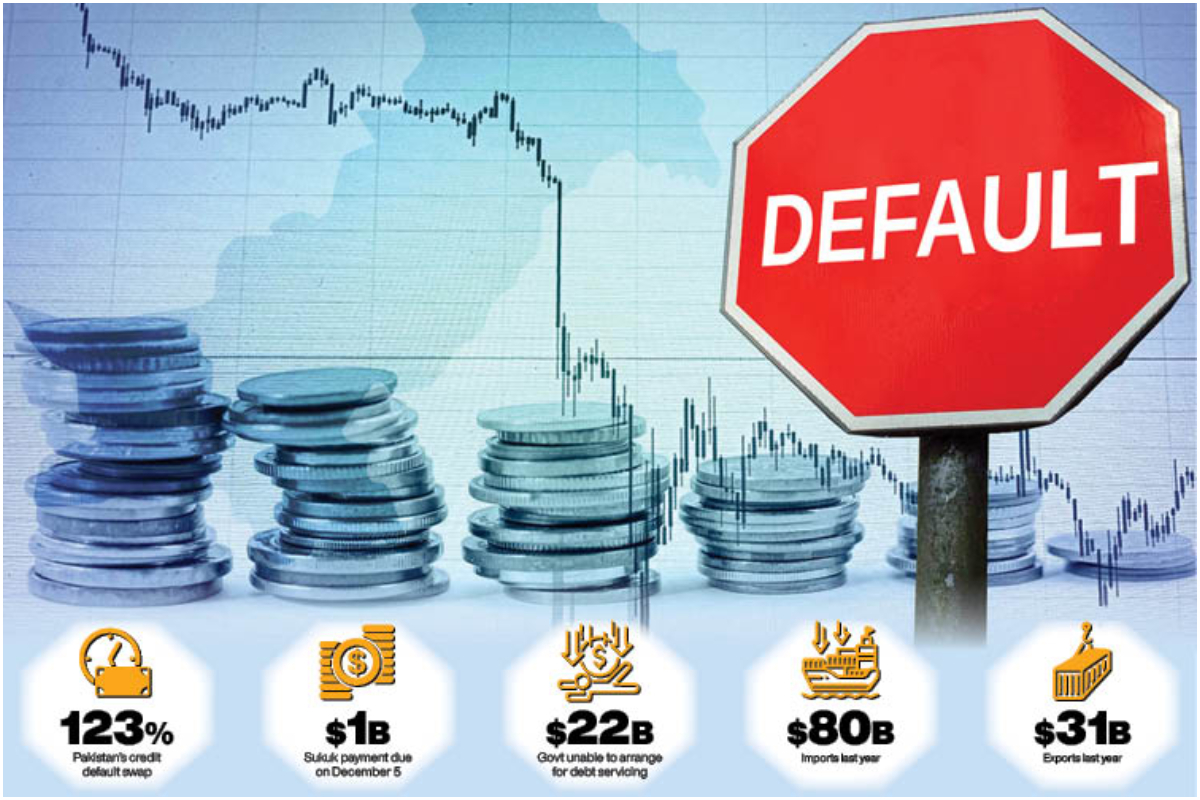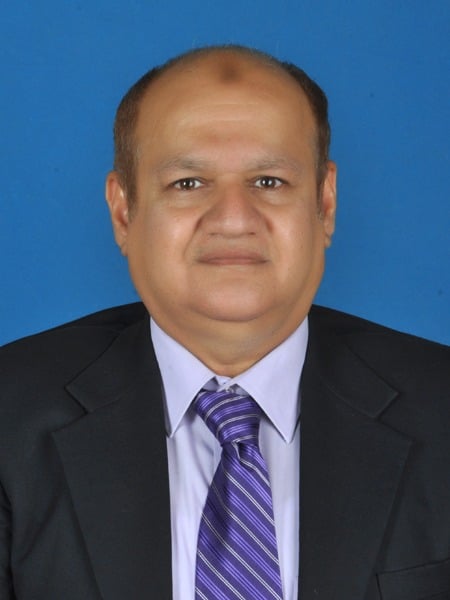
Time to Hit the Panic Button
Pakistan on verge of ‘default’ but government still in denial
IslamabadL: With the deepening financial and economic crises in the country, the perception of a default by the early next year is gaining strength. However, despite stagnant exports and remittances, Finance Minister Ishaq Dar’s rhetoric that “All is well” may push the economy in a black hole from which a return will be a mammoth task.
To counter the negative sentiments in the international market, Dar is giving assurances that Pakistan is not going to default, as the government is committed to repay $1 billion for the maturing bonds.
“We have never defaulted before and, this time too, we will not even be close to a default,” the minister said in his brief address on the state-run PTV.
Dar stressed that the $1 billion payment for Sukuk, or Islamic bonds, scheduled to mature on December 5, would be made on time, without any delay, and insisted that arrangements had been made for the upcoming payments.
However, Pakistan government’s repeated assurances failed to win the confidence of the global bond investors, as the country’s default risk, measured through the five-year credit default swap (CDS), worsened to a record high of 123 per cent.
Such a massive spike in the credit default swap occurred because the government is still unable to arrange $22 billion for debt servicing and to finance the twin deficits, while it also delayed the staff-level talks with the International Monetary Fund (IMF), which was scheduled for October 2022.
After leading rating agencies Moody’s, S&P and Fitch, Japanese Bank Nomura in its latest report warned that Pakistan is among those seven countries, which are now at a high risk of currency crisis.
The Japanese bank said that 22 of the 32 countries covered by its in-house ‘Damocles’ warning system have seen their risk rise since its last update since May, with the largest increases in the Czech Republic and Brazil.
Not only the rating agencies but the Pakistan Muslim League (PML-N) leader and former finance minister Miftah Ismail also echoing the same concerns. In his article for an English daily, Ismail wrote: “Today, our default risk has climbed up again and reached dangerous levels. This risk won’t vanish even after the December bonds are paid off. At the risk of sounding an alarm, I have to say that we have no room left for errors. Concrete measures are urgently needed.”
“We would have been happy if the dollar had organically depreciated but I was not in favour of either, spending money or issuing administrative fiats to keep the dollar at a certain rate,” he added.
“I do not know what the optimal rate of the dollar is; I think only the market can determine that. Last year, our imports stood at $80 billion and we exported goods worth only $31 billion. Surely, the top priority of the finance minister should not be to make imports cheaper and exports harder, which is what an appreciated rupee does. We have been down this road before in 2007/08 and 2017/18, without any joy.
Miftah also wrote: “Today, there is a large and persistent difference between the open market and the interbank exchange rates. This suggests that the State Bank is informally guiding the banks on the exchange rate. The large difference is also detrimental to our exports and remittances and is encouraging imports.”
“The other criticisms were increasing the price of fuel and imposing new taxes. But should our government be selling petrol at a loss? Moreover, if there are 2.2 million shops in Pakistan and only 30,000 pay income tax, is it not fair to ask them to pay just Rs3,000/month?” He questioned.
“There comes a time when the national interest must prevail over political interest. This is that time. This government will have no right to criticise the Pakistan Tehreek-e-Insaf (PTI) or anyone else if, having eagerly decided to come into power, it is unable to do what is right for the country,” the former finance minister said.
Miftah’s concerns are further endorsed by the major stakeholders of the economy and leading economists of the country.
Senior economist Dr Ikramul Haq said that the finance minister is in a state of self-denial.
“He (Dar) wants to hide the gravity of the situation on the economic front from the media and public,” he said, adding that the risk of default is looming large on the country because the government, even after rescheduling the Chinese loans and debt relief from the G7 countries, needs over $20 billion for its external debt obligations.
“I fail to understand how come Dar in talk shows or in media briefing claims that the value of the rupee against the dollar is in the range of 190 to 200, despite the widening current account deficit. For me, this is criminal negligence. His claims are totally fictitious and based on assumptions,” he remarked.
“The finance minister’s claims to attract huge Chinese and Saudi investment now proved wrong,” he added.
According to Dr Haq, in such a hostile political environment even the local investors are reluctant to invest, how Saudi or Chinese investors could take such a huge risk?
The Federal Board of Revenue (FBR) chairman had already indicated that because of the import restrictions and a slowdown in the economic activities, the revenue target of Rs7.47 trillion is unlikely to be achieved.
“To meet the target, the second quarter needs to collect 61 per cent more revenue, which is near to impossible and it also means that the government will not be able to achieve the primary surplus committed to the IMF,” he observed.
For Dr Haq, despite such a fluid economic situation both the Pakistan Democratic Movement (PDM) and the Pakistan Tehreek-e-Insaf (PTI) are spending public money lavishly on their political campaigns. Unfortunately, these political parties hardly bother that over 20 per cent inflation has badly impacted the common man.
State Minister for Revenue Dr Aisha Ghaus Pasha in the meeting of the National Assembly’s Finance Committee said that the circumstances are difficult but we have to remain in the IMF programme and make more structural adjustments.
The IMF team and the government were examining the implications of the flash floods, as the authorities had to immediately provide additional funds worth Rs120 billion for the flood relief through the Benazir Income Support Programme (BISP) and the national disaster management relief.
“They are sympathetic and once the numbers are agreed upon, the talks would move forward on the ninth review,” she said, adding that the floods had severely disturbed the macroeconomic framework and the IMF had asked the authorities to come up with all the specific expenditures that would be accommodated this year.
The IMF has also asked Pakistan to timely finalise the recovery plan.
Pakistan was already battling a full-blown economic crisis, with decades-high inflation and dwindling foreign exchange reserves, when it was hit by the floods earlier this year.
It had entered a $6 billion IMF bailout programme in 2019 and the ninth review is currently pending.
“The timely finalisation of the recovery plan is essential to support the discussions, along with the continuing financial support from multilateral and bilateral partners,” IMF resident representative Esther Perez Ruiz said in a message released to the media.
The IMF staff is continuing discussions with the Pakistani authorities over policies to re-prioritise and better target support towards humanitarian needs, while accelerating reform efforts to preserve economic and fiscal sustainability, she added.
Former PTI spokesman on finance and senior economist Muzzamil Aslam said that the government needs over $20 billion to meet its debt obligations and for the financing of the current account deficit.
If the government succeeded in bringing down the current account to zero, even then, it needs $10 billion to repay external debt, which is an uphill task.
“The government could only arrange $2 billion for debt financing and what I am fearing is that this incumbent government will transfer all its liabilities to the caretaker setup formed before the elections and there is no way that it will handle that kind of challenging position,” he added.
The state-owned Pakistan State Oil’s (PSO) liquidity crisis has swooped to an all-time high with an unprecedented hike in its receivables to Rs621.168 billion and payables to Rs268.5 billion.
This has made the state entity unable to offload its liabilities regarding the letters of credit (LCs), amounting to Rs218.5 billion for the import of furnace oil and liquefied natural gas.
The exports in the first five months remained almost static, while it declined 4 per cent in October, whereas the remittances also declined by around 16 per cent in five months.
comments

We have never defaulted before and, this time too, we will not even be close to a default, as the $1 billion payment for Sukuk would be made on time
Ishaq Dar
Finance minister

Today, our default risk has climbed up again and reached dangerous levels. This risk won’t vanish even after the December bonds are paid off
Miftah Ismail
Former finance minister

He (Dar) wants to hide the gravity of the situation on the economic front from the media and public, as the risk of default is looming large on the country
Dr Ikramul Haq
Senior economist
Catch all the Economic Pulse News, Breaking News Event and Latest News Updates on The BOL News
Download The BOL News App to get the Daily News Update & Live News.








 Read the complete story text.
Read the complete story text. Listen to audio of the story.
Listen to audio of the story.